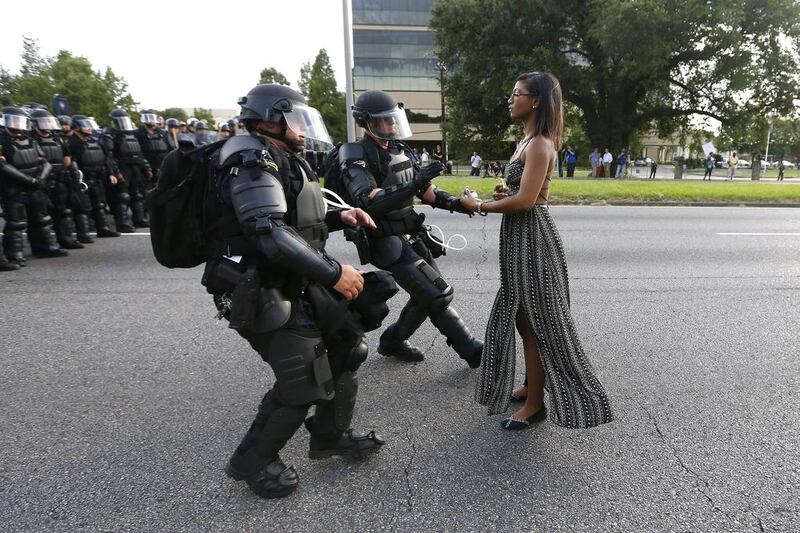‘America is not as divided as some have suggested,” Barack Obama said on Saturday, following a week in which two separate murders of innocent black citizens by white police officers sparked an outpouring of rage and, in one of the resulting demonstrations, five Dallas police officers were murdered by an African-American army veteran who cast himself in the role of an avenging sniper before being killed by police. Sadly, Mr Obama is wrong.
More sickening reminders come almost every day that the America in which black people live is an altogether different, and often quite terrifying country as armed white men, acting with the impunity that comes with a uniform, subject them to racist harassment and violence in the name of “law enforcement”. Any hope that Mr Obama’s election as America’s first black president marked a transition to a “post-racial” society have long since given way to explosive outrage at the steadily growing list of innocent black people killed by police officers. This week America was horrified by the killing of Alton Sterling in Baton Rouge and Philando Castile – respectively number 135 and 136 on the list of black people killed by police this year alone.
The brutal reality is that despite having elected a black president and annually honouring Martin Luther King, Jr, with a national holiday, the US remains as dangerous to the ordinary black man or woman going about their business as apartheid South Africa ever was. Often, black victims have been killed by police after being apprehended on some triviality or none at all.
Every parent of a black child in America faces the challenge of preparing that child for a world in which their appearance alone negates their innocence in the eyes of some empowered to wield violence on behalf of the state. Even if they survive physically, they carry the psychological scars of knowing that any of those victims could have been them, and that the perpetrators are rarely held to account. The slogan “Black Lives Matter!” is a challenge to a system whose actions clearly devalue black lives.
One of the more remarkable statements following last week’s tragedies came from Newt Gingrich, would-be Donald Trump running mate, who declared: “If you are a normal white American, the truth is, you don’t understand being black in America.” Mr Gingrich added that white Americans “instinctively underestimate the level of discrimination and the level of additional risk”.
That much is confirmed by a Pew study on American racial attitudes released two weeks ago. Only half of white respondents believe the US has fallen short and needs to do more to achieve racial equality; four in ten believed that enough changes had already been made. That’s compared with 88 per cent of black people who believe the US has more work to do. And after eight years of a black presidency in which there has been an unending stream of unarmed black people killed by police, 44 per cent of black respondents expressed doubt that racial equality will ever be achieved.
Only half of white respondents believe that police treat black people less fairly, compared with 84 per cent of black respondents. And one-third of white respondents held the rather astonishing view that Mr Obama has made race relations in America worse. Six in ten Republican voters also told Pew that too much attention is paid to the question of race.
Mr Obama has, in fact, seemed reluctant to take a lead on racial issues while in office. Technology is probably the reason there’s more conversation about racism and policing today than ever before: mobile phones combine with social media to make police violence impossible to hide. Phone video of Alton Sterling’s shooting by police who had him pinned to the ground was broadcast all over social media within hours. Castile’s girlfriend live-streamed her companion’s final moments via Facebook even as the killer cop pointed his gun at her.
The ugly reality is that were Mr Obama to have been travelling incognito down the street of Falcon Heights, Minnesota, last week in a car with a broken tail-light, he could just as easily have been Castile – shot four times by a white policeman while following the officer’s instructions, with his girlfriend seated beside him in the front seat and her daughter in the back seat.
Mr Obama is right that most Americans are united in revulsion at the killing of policemen in Dallas, but they are sharply divided when it comes to the Black Lives Matter cause. The Pew study found that 41 per cent of black respondents “strongly support” the movement, compared to just 14 per cent of white respondents.
The proverbial long hot summer awaits, in a political season that had raised the level of polarisation past boiling point even before the latest wave of Black Lives Matter Protests.
Mr Trump runs on an unashamedly bigoted ticket, his “Make America Great Again” mantras and attacks on “political correctness” – by which he means a civic attitude that forbids bigotry – offering a return to a more unapologetic era of white supremacy.
But young people of colour are no longer willing to tolerate the peril they face, and are taking to the streets rather than place their faith in the political system addressing the crisis. Mr Obama’s talk of an America united across racial lines remains nothing more than an aspiration. The country he leads is drifting into dangerous and entirely uncharted waters.
Tony Karon teaches at the New School in New York





